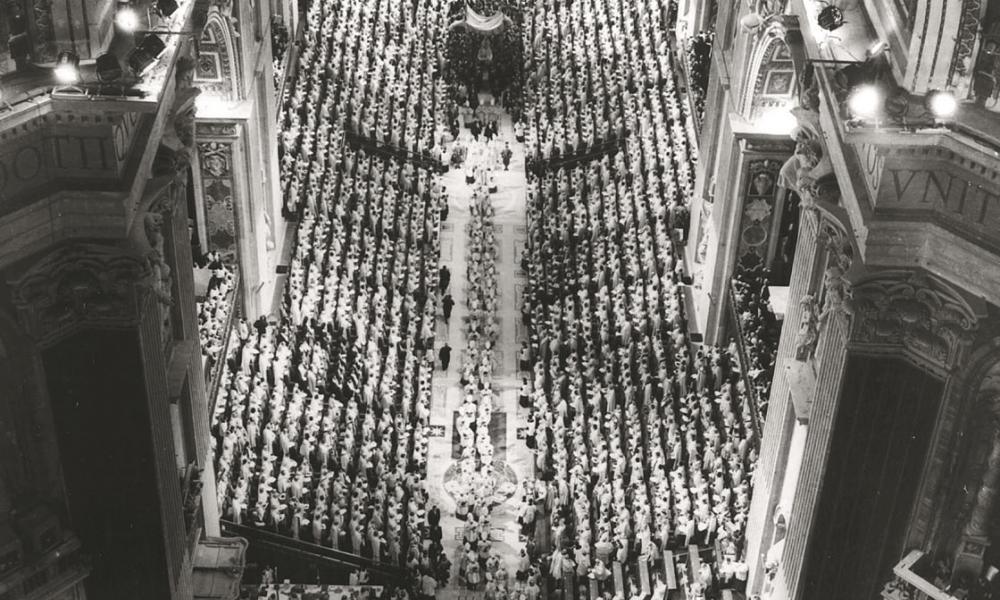
Sacraments Part 1: Baptism
What We Do is What We Believe
What We Do is What We Believe
What are the steps to becoming Catholic?
We welcome new adult members into our faith with the Church’s official rite, The Rite of Christian Initiation of Adults (RCIA). Developed after Vatican II, it restores a very ancient practice in the Church - a catechumenate process. A catechumen (’one under instruction’) is called to follow Christ through the ’many forms of God’s grace’ (RCIA 5). His or her journey of faith is a gradual one, done best within a community of the faithful.
With catechesis based on the Scriptures, by living the Christian life, by practicing apostolic works, and by celebrating the rites of the Church (RCIA 75), the catechumens (and we) are called to reflect on the value of the paschal mystery and on their lives as Catholic Christians. This journey includes periods of preparation and steps which are marked by liturgical rites (see page 18). Because this process has a particularly paschal character - entering into the dying and rising of Jesus Christ - it is most appropriate that the catechumen is initiated at the Easter Vigil. At that time, he or she will receive all three sacraments of initiation - baptism, confirmation, and Eucharist. A period of mystagogia (’the mysteries revealed’) follows. Though intense during the 50 days of Easter, this period is just the beginning of a life-long faith formation and participation in the sacramental life of the Church.
Who initiates new members into the Church?
We all do! "... the people of God, as represented by the local Church, should understand and show by their concern that the initiation of adults is the responsibility of all the baptized" (RCIA 9).
We invite them to know our Savior and to join our Church; we offer hospitality, we answer their questions to the best of our ability, we welcome them to Mass, and we are present at the various rites. We warmly welcome them to the font of life, to the sacrament of confirmation, and to eat with us at the Lord’s Table. Some of us may serve as godparents and sponsors; others serve as catechists. Bishops, priests, deacons, RCIA team members have special roles, but we all initiate them into our community of faith.
For Further Reading
The Rites of Christian Initiation: Their Evolution and Interpretation. by Maxwell Johnson Collegeville: The Liturgical Press, 1999.
The RCIA: Transforming the Church by Thomas Morris . Mahwah, NJ: Paulist Press, 1997.
Christening: The Making of Christians by Mark Searle Collegeville: The Liturgical Press, 1980.
The Awe-inspiring Rites of Initiation: The Origins of the RCIA by Edward Yarnold Collegeville: The Liturgical Press, 1994.
Timeline: 14 major developments in bringing new members into the faith
100 Didache Author Unknown
"Baptize in the name of the Father and of the Son and of the Holy Spirit, in running water. But if you do not have running water, baptize in other water; and if you cannot in cold water, then in warm. And if you do not have either, pour water three times upon the head, in the name of the Father and Son and Holy Spirit. And before baptism, let the baptizer and him that is to be baptized and others first fast one or two days before."
160 First Apology by Justin Martyr
"Then they are led to a place where there is water, and they are reborn after the manner of rebirth by which we were also reborn; for they are then washed in the name of the Father and Lord of all good things, and of our Savior Jesus Christ, and of the Holy Spirit... After we have thus washed him ... we lead him to those who are called brethren, where they are assembled and make common prayer ... At the conclusion of the prayers, we greet one another with a kiss. Then bread and chalice containing wine mixed with water are presented to the one presiding over the brethren. ... At the end, all present express their approval..."
203 de Baptismo by Tertullian
"Those who have prepared for baptism are urged "to pray, with frequent prayers, fastings, and bending of the knee, and all-night vigils, along with the confession of all their sins. Daily exorcism is preferred ... abstain from daily bath for a week.""
"An invocation of the Holy Spirit over the baptismal water... Renunciation of the devil and three-fold creedal interrogations along with three immersions, a post-baptismal anointing... laying on of hands and a welcoming of the Holy Spirit... the neophyte is welcomed into the assembly and given a drink of milk and honey.
"Suitable time for initiation is Easter, or if not Easter, then Pentecost, or any day. "Christians are made, not born."" Basis For Current RCIA
215 Apostolic Tradition
(usually attributed to Hippolytus) [Period of the Catechumenate]
(17-19) "Catechumens are instructed for three years, we lay hands on them and dismiss them... If he suffers violence and is put to death before baptism, he shall be justified by having been baptized in his own blood."
350 Mystagogical Catechesis by Cyril of Jerusalem
"... You have been made fit to receive the more sacred mysteries, having been counted worthy of divine and life-giving baptism. It remains therefore to dress for you a board of perfect instruction, let us now teach you exactly about these things, that you may know the deep meaning of the effect wrought upon you on that evening of your baptism."
400 Diary of a Pilgrim by Egeria
"The bishop examines the sponsors as to their readiness and writes in the names of the catechumens at the Martyrium. They fast and experience daily exorcisms during the eight [sic.] weeks of Lent. For three hours each day the bishop teaches them Scripture. Five weeks later the bishop presents them the Creed and explains it to them."
5-12th centuries
Gradual dissolution of the rites of initiation into three separate sacraments.
Because of high infant mortality rate, children are baptized immediately after birth. In the West, the bishop reserves the sacrament of confirmation to himself.
1274 Council of Lyons
Declares that the Church has no more nor less than seven sacraments.
1439 Council of Florence Declares the sacraments contain and confer grace.
1548-1563 The Council of Trent Defines the sacraments.
16-20th centuries Rite for emergency baptism becomes the norm for both adults and children.
Constitution on the Sacred Liturgy 1963 Vatican II
"The catechumenate for adults, comprising several distinct steps is to be restored and to be put into use at the discretion of the local bishop. By this means the period of the Catechumenate, which is intended as a time of suitable instruction, may be sanctified by sacred rites to be celebrated at successive intervals."
1974 Rite of Christian Initiation of Adults
First edition of RCIA is promulgated, intended for pastoral use and study.
1988 Use of the RCIA becomes mandatory for use in the United States.



